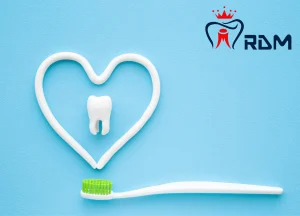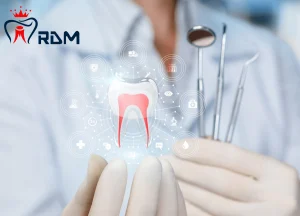A beautiful smile can light up a room and boost your confidence, but it’s not just about aesthetics – oral health is essential for overall well-being. The mouth is a gateway to the body, and poor oral hygiene has been linked to various systemic diseases. In this article of RDM Dental, we will explore ten simple yet effective ways to keep your teeth healthy for a lifetime of radiant smiles.
1-Brush Like a Pro:
Proper brushing technique removes plaque and food particles from your teeth. To brush like a pro, use a soft-bristled toothbrush that is comfortable to hold and easy to maneuver around your teeth. Next, squeeze a pea-sized amount of fluoride toothpaste onto your toothbrush. Place the toothbrush against your teeth at a 45-degree angle, pointing towards the gum line. Then, gently move the toothbrush back and forth in small circular motions, making sure to cover all surfaces of your teeth. Pay special attention to areas where your teeth and gums meet, as this is a common place for plaque to build up. Finally, brush your tongue and the roof of your mouth to remove bacteria and freshen your breath. Remember to replace your toothbrush every three months or sooner if the bristles become frayed.
2-Floss Daily:
Flossing is an essential part of your oral hygiene routine, as it helps to remove food particles and plaque between your teeth and under your gum line. To floss daily, wrap a piece around your middle fingers, leaving about two inches of floss between them. Hold the floss tightly between your thumbs and index fingers, with the floss taut. Guide the floss between your teeth using a zigzag motion, curving the floss around the base of each tooth in a C-shape. Make sure to go beneath the gumline, where bacteria and plaque accumulate. Once you have flossed between all your teeth, wrap the floss around your middle fingers again and repeat the process until you have flossed all your teeth.
3-Rinse with Mouthwash:
Mouthwash can help to kill bacteria and freshen your breath. To use mouthwash effectively:
- Start by choosing a mouthwash that contains fluoride and is alcohol-free.
- Pour a small amount of mouthwash into your mouth and swish it around, making sure to coat all surfaces of your teeth and gums.
- Hold the mouthwash in your mouth for 30 seconds to one minute, then spit it out.
- Avoid swallowing mouthwash, as it can contain harmful ingredients.
Rinsing with mouthwash once or twice a day can help to keep your teeth and gums healthy.
4-Eat a Balanced Diet:
Eating a balanced diet is essential for maintaining healthy teeth and gums. Aim to eat various fruits, vegetables, whole grains, lean proteins, and dairy products. These foods provide essential nutrients and minerals that help to keep your teeth and gums strong. Limit your sugary snacks and drinks intake, as they can contribute to tooth decay and other oral health problems. Also, stay hydrated by drinking plenty of water throughout the day. A healthy diet and good oral hygiene habits can help keep your teeth and gums healthy for years.
5-Visit Your Dentist Regularly:
Regular dental visits are crucial for maintaining good oral health. Aim to visit your dentist at least twice yearly for a professional cleaning and examination. During these visits, your dentist will remove any tartar buildup and check for signs of oral health problems. They may also recommend additional treatments, such as fillings or crowns, to help restore your teeth. Regular dental visits can help to catch oral health problems early on when they are easier to treat. Additionally, seeing your dentist regularly can help prevent bad breath, toothaches, and other oral health issues. Combining good oral hygiene habits with regular dental visits can keep your teeth and gums healthy for a lifetime.
6-Avoid Tobacco Products:
Tobacco products are harmful to your overall health and can cause significant damage to your oral health. Smoking and using other forms of tobacco can lead to various oral health issues, including gum disease, tooth decay, and oral cancer. If you’re a smoker or user of other tobacco products, consider quitting. Not only will this improve your oral health, but it will also benefit your overall well-being. If you’re having trouble quitting, talk to your dentist or doctor about resources and support available to help you kick the habit.
7-Monitor Your Medications:
Certain medications can have adverse effects on your oral health. For example, some medications can dry out your mouth, increasing tooth decay risk. Other medications can cause gum inflammation or discoloration of the teeth. It’s essential to inform your dentist of any medications you’re currently taking so they can monitor your oral health and recommend appropriate treatments if needed. If you notice any changes in your oral health while taking medication, discuss them with your dentist or doctor.
8-Practice Good Oral Hygiene During Orthodontic Treatment:
If you’re undergoing orthodontic treatment, such as wearing braces or aligners, it’s crucial to maintain excellent oral hygiene. This means brushing your teeth thoroughly after meals and bedtime, using fluoride toothpaste and a soft-bristled toothbrush. Ensure you enter all the nooks and crannies around your brackets and wires. Additionally, floss once daily to remove food particles and plaque between your teeth and under your gum line. Dental picks or interproximal brushes can help you clean around your brackets. Regular visits to your orthodontist for adjustments and cleanings will also help keep your teeth and gums healthy throughout Orthodontic treatment.
9-Protect Your Teeth from Grinding and Clenching:
Grinding and clenching your teeth, known as bruxism, can lead to chipped or cracked teeth, tooth sensitivity, and jaw pain. Try stress reduction techniques like deep breathing exercises, meditation, or yoga to prevent this. You can also wear a custom-made mouthguard at night to protect your teeth from grinding and clenching while you sleep. Avoiding chewing on non-food items like pens or ice can also help break the clenching and grinding habit. If you experience persistent jaw pain or headaches, consult your dentist about possible treatments, such as physical therapy or Botox injections.
10-Avoid Acidic Drinks and Foods:
Acidic drinks and foods can erode tooth enamel over time, leaving teeth vulnerable to decay and sensitivity. Limit your consumption of acidic fruits like lemons, limes, and oranges, and avoid sipping on soda or sports drinks throughout the day. Instead, opt for water or milk to stay hydrated. If you consume acidic foods or drinks, rinse your mouth with plain water afterward to neutralize the acid. Additionally, include calcium-rich foods, such as dairy products, leafy greens, and nuts, to promote strong teeth and bones.
Read More:
How dental health affects overall health
Conclusion:
In conclusion, maintaining good oral health requires a combination of regular dental check-ups, proper oral hygiene practices, and a balanced diet. It is essential to visit a dentist regularly to catch any potential problems early on and to receive professional cleanings and examinations. Additionally, practicing good oral hygiene habits such as brushing and flossing daily, using fluoride toothpaste, and avoiding tobacco products can help prevent oral health issues. A balanced diet with nutrient-rich foods can also contribute to oral health.






